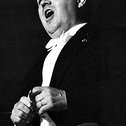Информация об исполнителе
Björling (surname also spelled as "Bjoerling" and "Bjorling" in English-language sources) was born in Borlänge, Dalarna, Sweden, in February 1911. The midwife's register shows he was born on 5 February; however, the church baptism records erroneously show 2 February, and this was the day on which he celebrated his birthday throughout his life.[1] His father David was an accomplished vocalist and the first teacher of Jussi and his two brothers, Olle and Gösta, who also went on to become professional singers. He also performed with his sons as Björlingkvartetten or the Björling Male Quartet. Jussi made his debut public appearance at five years of age.[2] The group performed in concerts throughout Sweden and the United States for eleven and a half years. He later studied opera with John Forsell.
Björling made his professional operatic debut as the Lamplighter in Manon Lescaut at the Royal Swedish Opera in Stockholm in 1930. This was soon followed by Don Ottavio in Mozart's Don Giovanni, Arnold in Rossini's William Tell, Almaviva in Rossini's The Barber of Seville and as Rodolfo in La bohème with Hjördis Schymberg, his favourite soprano in Sweden, as Mimi. This in turn led to engagements in Europe and the United States. Björling made his American concert debut at the Carnegie Hall in 1937; the following year, he made his debut at the Metropolitan Opera as Rodolfo in La bohème.
Björling made his professional operatic debut as the Lamplighter in Manon Lescaut at the Royal Swedish Opera in Stockholm in 1930. This was soon followed by Don Ottavio in Mozart's Don Giovanni, Arnold in Rossini's William Tell, Almaviva in Rossini's The Barber of Seville and as Rodolfo in La bohème with Hjördis Schymberg, his favourite soprano in Sweden, as Mimi. This in turn led to engagements in Europe and the United States. Björling made his American concert debut at the Carnegie Hall in 1937; the following year, he made his debut at the Metropolitan Opera as Rodolfo in La bohème.
показывать / спрятать больше







 |
|



![VA - The Greatest Tenor Show On Earth (1999) [FLAC (tracks + .cue)] VA - The Greatest Tenor Show On Earth (1999) [FLAC (tracks + .cue)]](cache/thumbnail31/browse303890.jpg)